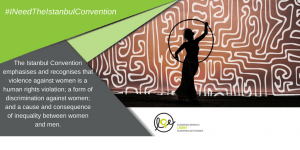
Disappointing lack of progress on violence against women one year after EU signing landmark Treaty
Brussels, 13 June 2018 – On the occasion of the first anniversary of the signature of the Istanbul Convention by the European Union (EU), the European Coalition to end Violence against Women and Girls regrets that strong progress towards the ratification has been hindered by retrograde forces, and calls for concluding the process without further delay.
Violence against women threatens the security of half of the population in the EU, affecting over 250 million women and girls. One in three women has experienced physical and/or sexual violence since the age of 15 and 96% of EU citizens consider that violence against women is unacceptable. European citizens want action and there is no more time to waste.
The Council of Europe Convention on Preventing and Combatting Violence against women and domestic violence, the Istanbul Convention, is the first legally binding treaty in Europe that criminalises multiple forms of violence against women. It emphasises and recognises that violence against women is a human rights violation, a form of discrimination against women, and a cause and consequence of inequality between women and men.
On 13 June 2017, the EU signed the Istanbul Convention, sending a very strong political message on its commitment to end violence against women and girls.
Yet today, one year on the EU has unfortunately made little progress with the ratification process. While the European Parliament adopted a strong resolution last September, the Council negotiations on the Code of Conduct remain ongoing, and, with a complex process to undertake in accession to the Convention, the need for immediate action has become critical. Therefore, we urge the upcoming Austrian EU Presidency to stand up for women and advance the ratification process as swiftly as possible, to ensure that all women and girls in Europe can live their lives free from violence.
We, the European Coalition to end Violence against Women and Girls call for
- The Council of the European Union to ratify immediately the Istanbul Convention, within the most effective scope of EU competence;
- EU Member States who have not yet done so to ratify the Istanbul Convention without further delay and without reservations, and to put in place the necessary legislative and policy framework to ensure its adequate implementation, including allocating sustainable and adequate funding, and cooperating with civil society and women’s rights organisations;
- EU Institutions to fully integrate the Istanbul Convention into the EU legislation and policy framework, establishing an effective and representative EU monitoring framework;
- The European Commission and EU Member States to develop a comprehensive EU Strategy to prevent and combat all forms of violence against women and girls, and to address all the structural issues that fuel this violence;
- The EU to appoint an EU coordinator on ending violence against women and girls, with a strong political mandate and responsibility to: coordinate the EU Strategy and all the efforts of the relevant EU Institutions and agencies (EIGE, FRA, EUROJUST, EASO, EUROSTAT, etc.); and to facilitate the exchange of good practices for the implementation of the Convention at the national level.
We hope that next year we will not celebrate another anniversary without the final EU ratification.
The European Coalition to End Violence against Women and Girls is an extensive strategic alliance of more than 25 cross-European human rights and social justice civil society organisations working collectively to ensure that women and girls across Europe can live their lives free from all forms of violence.
